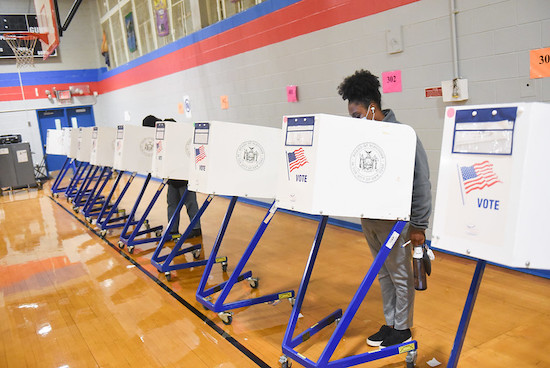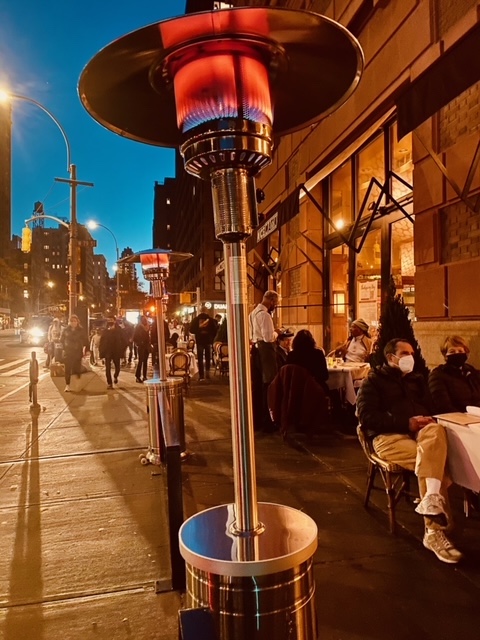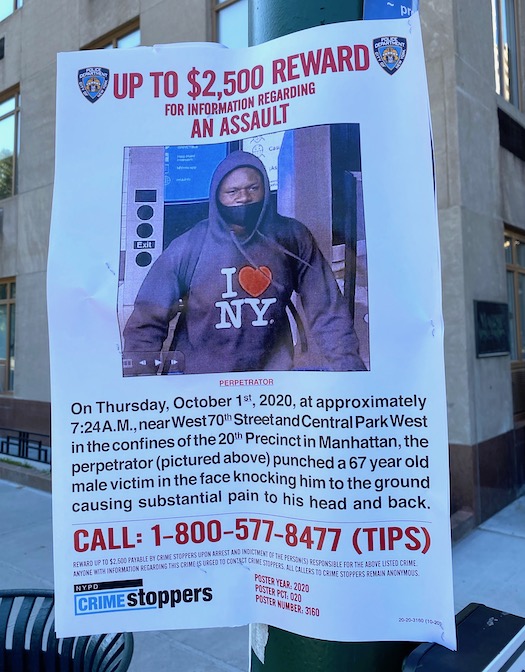By Amelia Roth-Dishy
With the presidential election limping to its conclusion, New Yorkers can finally focus on a race closer to home: the 2021 NYC mayoral election. The Upper West Side played digital host to the first neighborhood-based mayoral forum of this election cycle on Thursday night as eight Democratic candidates for the city’s highest elected office pleaded their case. The Zoom event, organized by the West Side Democrats, had an unusual yet effective format. Each candidate received six minutes to speak uninterrupted, followed by three minutes of questions generated from the 300+ audience members.
The imperative for mayoral hopefuls to sell their extended elevator pitch is uniquely heightened this year, not just by the fiscal and social crises facing the city during a pandemic but by the introduction of ranked-choice voting to New Yorkers’ ballots. A ranked-choice voting system requires voters to rank candidates in order of preference, with the election turning to a multi-phase elimination process in the event that no candidate receives over 50% of the first place votes. As such, even second- or third-choice votes are worth fighting for.
Most of the race’s notable Democratic candidates spoke on Tuesday, including Brooklyn Borough President Eric Adams, former Office of Management and Budget director Shaun Donovan, former NYC Dept. of Sanitation commissioner Kathryn Garcia, City Council Member Carlos Menchaca, non-profit executive Dianne Morales, Comptroller Scott Stringer, former NYC Dept. of Veteran Services Commissioner Loree Sutton, and civil rights attorney and former de Blasio advisor Maya Wiley. Ray McGuire, a Citigroup executive running with significant support from the business community, was notably absent.
While the event had no explicit theme or direct dialogue between candidates, a handful of topics stood out over the course of the night. Almost every candidate addressed issues of housing and homelessness in the city, highlighting plans for increased affordable housing and wraparound social services.
Donovan, the former secretary of Housing and Urban Development under President Obama and Bloomberg’s HPD Commissioner, stated that “we can reimagine the right to shelter in New York City as a right to housing.”
Council Member Menchaca, whose district includes Sunset Park and Red Hook, referenced his work in securing two new 100% affordable housing projects for his constituents. “Those are the kinds of things that I want to do as mayor,” he said, “is to really think about how we bring the resources of the capital budget so that we can bring affordability, true affordability, to our communities.”
A number of candidates fielded questions about a New York City land bank, which Comptroller Stringer’s office proposed in 2016. Stringer reaffirmed his commitment to building affordable housing through community partnerships on city-owned land and also advocated for a 25% affordability requirement in as-of-right developments (most as-of-right developments today don’t have to provide affordable housing). “We’ve done this before,” he said. “We have to go back into the housing business as a city.” Donovan supported the idea, calling land banks “a critically important example of the ways that we can ensure public ownership of land.”
Candidates generally tiptoed around the tense neighborhood debate about the Lucerne and using hotels as shelters for unhoused New Yorkers. In response to a question about mitigating NIMBY-ism, Wiley, the former chair of the Civilian Complaint Review Board, said, “I think it starts from a very engaged process with residents, both that’s transparent about what we’re doing, why we’re doing it, and ensures that every community does its part, because that’s what being a city and working together means.”
Sutton, a retired brigadier general in the Army, more explicitly addressed the West Side crowd. “You all know all too well that the process that took hundreds of homeless individuals and placed them without preparing us community members without preparing the homeless individuals themselves, or the surrounding communities— that’s just wrong,” she said. “And it’s pit New Yorkers against each other.”
In his opening remarks, Borough President Adams utilized some of the quality-of-life rhetoric that has animated the Lucerne debate over the past few months. “I get it that you walk out your door and are seeing people insert needles in their arms and urination and other things in the streets that we have not witnessed in a long time,” he said. He emphasized municipal government’s operational failures and articulated his candidacy as one of both unity and efficiency. “Our cities are made up of agencies and if the agencies are not doing their job, it doesn’t matter how much money we put in our city, the dysfunctionality is going to exist,” he said. “And the inefficiencies we see every day are leading to inequalities.”
The COVID-19 pandemic cast an obvious spectre over the evening as cases continue to rise in the city after months of steadily low rates. All candidates emphasized the next mayor’s mandate to revitalize the city’s economy and protect middle- and low-income families. Former Commissioner Garcia, who has positioned herself as an operations specialist experienced in crisis management, highlighted the impending challenge of rolling out a vaccine for all New Yorkers. “By the time your new mayor is sworn into office in January 2022, we will have the vaccine,” she said. “The most important step to our recovery is for every New Yorker to have fast, free, easy access. I’m an operations person. This is what I do best.”
Morales— the former CEO of Phipps Neighborhoods, an influential social services organization in the Bronx— answered a question about improving and integrating New York public schools by describing what she called “a missed opportunity” in the pandemic era. “There’s no reason why we could not have begun to experiment with desegregating classrooms with the virtual model,” she said. “There’s no reason why the best teacher on the Upper East Side could not have a classroom that was comprised of students from the South Bronx, and from Brownsville, as well as the Upper East Side.”
A number of candidates were asked about municipal broadband — which Mayor de Blasio recently committed $157 million to expanding — and generally agreed on the city’s imperative to universalize it. “We have to convert broadband to a public good,” Garcia said. Morales mentioned building out “the mesh infrastructure,” citing her Bed-Stuy mutual aid group’s use of volunteer tech expertise to expand the network in their neighborhood.
Wiley, who was tasked with implementing universal broadband under De Blasio, emphasized the need to strategically deploy free broadband “where we know people can’t get it,” she said, “because it’s not going to cover the entire city.”
Questions of policing and NYPD misconduct were not addressed head-on. Borough President Adams, who served as an NYPD officer for 22 years, said, “it’s unfortunate that police agencies are not doing a good job, particularly in New York City, of weeding out those officers who are not suitable to lift up the nobility of a profession that I love and I think is important.”
Donovan responded to a direct question about defunding the police by saying, “I support reducing, reimagining, and reinvesting in our criminal justice system. I believe we ask our police to do too much.”
Sutton, who has positioned herself as a moderate alternative to the party’s progressive candidates, emphasized the city’s need to “restore safety” and, in her words, “make the NYPD the finest and most trusted police force in the country.”
Otherwise, the candidates jockeyed a bit on their progressive credentials. “I believe I am the true progressive in this race,” Donovan said in his remarks. Stringer touted his work as Comptroller to align the city’s finances with progressive values. “I also divested from private prisons, leading the divestment on climate and fossil fuel divestment,” he said.
When asked a question about transitioning to a community-owned structure in NYCHA buildings, Morales laughed and said, “Absolutely. I was worried there for a second that you were going to go to private.”
New York State Assemblymember Linda Rosenthal was in attendance, as well as City Council Member Helen Rosenthal. It was Assemblymember Rosenthal’s birthday and many of the candidates wished her a happy day at the beginning of their remarks.
Overall, the forum, an early attempt among many by this crowded field of candidates to differentiate themselves leading up to the June primary, portended a compelling eight months ahead.
“I think you’re going to get a lot of interesting ideas from this campaign trail,” Council Member Menchaca said. “And I want to look at all of them.”










Was this recorded by any chance? For those who might have missed it? Thanks for the in depth reporting!
I found a recording on West Side Democrats Facebook page: https://fb.watch/1MRKvw3MNL/
After the nightmarish reign of deBlasio, I think the candidates would be wise to run away from progressivism rather than towards it. The UWS might be the exception, but much of the city is tired of it.
Speaking of which, was there any discussion of how to bridge the huge budget gap the city is facing? All of these programs are great but we have to pay for them. And you can only tax the super wealthy so much.
And I think that it is great that we will have ranked choice voting – a very positive development!
@Leon:
Oh, no, the super wealthy can be taxed a lot more.
Reaganomics is a fraud.
You call De Blasio a nightmare but can’t cite specifics, while it’s easy to understand why Bloomberg and Giuliani were nightmares for large fractions of the City’s populace.
DeBlasio is a lazy procrastinator. I can’t wait until he’s gone.
This City is in even more trouble than it’s already in if these are the choices for next year. We need someone not beholden to the labor unions and the real estate industry. It will take years for us to get back to where we were. Government needs to downsize.
Jerome36:
What functions of City government are you willing to forgo?
There has been a very large increase in the City’s payroll since deBlasio began. Start there by cutting those jobs. Cut part of the 1.7 billion dollars of annual funding that goes to the MTA each year. The subway system needs to be rethought. Highly doubtful there will ever be the same ridership post-Covid.
Re: “We need someone not beholden to the labor unions….”
1. Labor unions build a strong middle-class, whose members then spend and support local business, creating a robust economy (cf. “Virtuous Cycle”);
2. NYC is, and always was, a UNION TOWN, and any politico who dares snub the unions is risking defeat in the next election;
3. If Corporate America has its supporters why can’t working people have theirs?
Yes, sometimes there are abuses, but, to paraphrase President Obama, we can’t let the perfect be the enemy of the good.
The two predecessors of DB could hardly be described as pro-union. One of them was re-elected and the other re-elected twice. Nothing suggests that a NYC mayor has to carry the union’s water.
Cathy Bernstein should run.Just sayin….She is a thoughtful westsider
If she’s “thoughtful,” I’m Martin Luther King, Jr. LOL.
God help us if these are the only choices. NO TO PROGRESSIVES unless you want the city to go down even further.
Clowns to the left of me, jokers to the right…
Curtis Sliwa, please run!
Yes. Please run…away from NYC and go somewhere else. LOL
Someone needs to press the candidates about how they are going to fix the financial mess caused by the Pandemic. New programs are great — but you need to pay for them let alone the holes caused in revenue. Did no one address that at all?
I can’t wait for DeBlasio to be gone. A person who just waffles all the time and gives in all the time to the Police and Real Estate Industry does no good for the city. He may be a progressive but the man is the most ineffective Mayor since Dinkins.
The “Progressives” have had their day and all they’ve done is fuel chaos, reduce our safety, and chase out our tax base. It’s once again time for a Mayor who actually knows how to run a city to take the helm and clean this mess up.
Rob G.
It’s Trump that destroyed the NYC tax base, with the help of Wall Street.
Huh? Care to elaborate on that one?
I think you are blaming “progressives” for the horrendous job that the mayor has done. But his performance does not and should not reflect on progressive values.
Progressive values are wonderful. As long as they don’t include condoning riots, supporting dangerous bail reform laws, pandering to the Defund-the-NYPD movement, ignoring quality-of-life issues, and race-baiting their own constituents. Did I miss anything?
Love your comment Rob G.
Ray McGuire is the only choice. He should get anyone’s backing who is tired of the incompetence and De Blasio clownshow.
Totally agree. He has Democrat values but also has business sense. He probably won’t be considered woke enough for the UWS (where he lives), but we need an adult in the room, and he can be that adult. Business experience is a good thing.
Vote for a democrat and the city will continue to deteriorate. We need the police to be able to do their jobs. That will never happen under a democrat. Getting to work for me everyday is a challenge with all the mentally ill and homeless lining the streets. And forget the subway.
Ella,
You must have moved to NYC in the last 12 months if you suppose homeless people on the street something new, or much more frequent now than in say 2012.
Progressivism has failed. It is time for a mayor who supports law and order and who cares about the quality of life for everyday New Yorkers.
Finally, a post that makes sense.
It’s hard to believe, after DeBlasio, and Cuomo for that matter, that ANYONE would vote for someone even similar to either them.
Our city was brought through the worst possible ordeal by a Republican mayor. Take a chance again…SHOULD A DECENT REPUBLICAN CANDIDATE BE PUT UP.
But then again, what can we expect from the Upper Left Side?
I wonder how many commentators on this voted for DeBlasio (twice). And now will vote for some version of the same thing. DeBlasios major failing is that he was a poor executive in the most literal meaning of that word. i.e he did not know how to run an organization. Bloomberg at least had some experience as an executive. Most career politicians don’t.